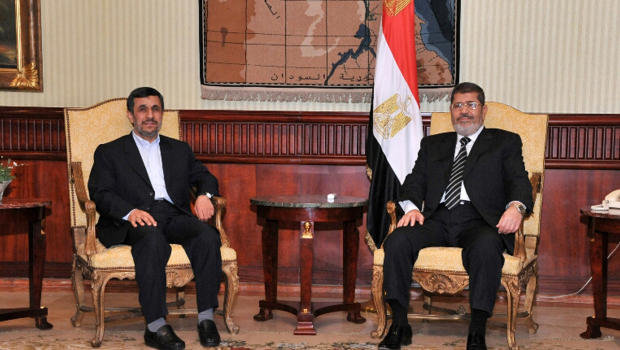Ahmadinejad's visit to Egypt sign of thaw in bilateral relations

By Sara Rajabova
Iranian President Mahmoud Ahmadinejad has made an historic visit to Egypt, becoming the first Iranian president to travel to Cairo since Iran's 1979 revolution ruptured diplomatic ties between the two most populous countries in the Middle East.
Ahmadinejad visited Egypt to attend the 12th summit of the Organization of Islamic Cooperation (OIC) held on February 2-7.
During Ahmadinejad's visit to Egypt taking place after three decades the future of the Iranian-Egyptian relations was under discussion.
The Iranian president stated that Iran-Egypt cooperation in different sectors is highly important and can have an impact on developments in the region.
Ahmadinejad said he hoped his trip would be a new starting point in the relations between Iran and Egypt.
In a meeting with his Iranian counterpart, Egyptian President Mohamed Mursi underscored the need for broader cooperation between Iran and Egypt, saying Tehran-Cairo relations are significant and influential both in the region and in the whole world.
The Iranian president also stressed his country's interest in economic cooperation with Egypt.
Ahmadinejad stressed that 10 million tourists from Iran annually visit a number of countries, adding that he would like for some of the tourists to visit Egypt.
After the OIC summit, Iran's Foreign Minister Ali Akbar Salehi said Iran will allow Egyptian traders and tourists to enter Iran without a visa.
Salehi said in statements in Egypt that within the next few months, all Egyptian tourists and traders would be able to visit the Islamic Republic of Iran without being required to have a visa.
He said this decision has been made in meetings with Egyptian officials in Cairo and in the framework of developing relations between the two countries.
Besides, Egypt welcomed Iranian investment in building petrochemical units in the country.
During Ahmadinejad's visit to Egypt, Iranian Oil Minister Rostam Qasemi announced that Iran plans to export crude oil to Egypt and named the country one of the new buyers of Iranian oil.
It is also reported that Iran's export to Egypt increased 1500 percent in the ten months of the current Iranian year, compared with last year.
However, despite this sign of cooperation Egypt remained indifferent to Iran's proposal and promise to provide a loan, as its foreign reserves had fallen below $15 billion, despite a loan from Qatar to support the Egyptian economy. It is considered that after obtaining an Iranian loan, Egypt will lose the financial support of the wealthy Gulf countries, especially Qatar and Saudi Arabia.
Ahmadinejad's trip is likely to be closely watched by Sunni Gulf nations, with the main one being Saudi Arabia, which is staunchly opposed to Iran's regional policies and deeply wary of the Shiite nation.
Moreover, while Ahmadinejad's visit is appreciated in his country as an important step for normalization of ties, the restoration of relations with Iran appears not to be deemed well by Egypt. The Egyptian Foreign Ministry downplayed the importance of Ahmadinejad's visit saying "the Iranian leader was in Cairo chiefly for the Islamic summit starting on Wednesday, so it's just a normal procedure, that's all".
The Iranian president's trip to Cairo was meant to underline a thaw in relations since Egyptians elected an Islamist head of state, Mohamed Mursi, last June. But it also highlighted deep theological and geopolitical differences.
Sunni-Shiite tensions dominated the talks Ahmadinejad held with Egypt's most prominent cleric, Sheik Ahmed el-Tayeb, who heads the Sunni world's most prestigious religious institution, Al-Azhar.
The Sunni scholar urged Iran to refrain from interfering in Gulf Arab states and put an end to Shia missionary activities in Egypt.
However, addressing the OIC summit, Ahmadinejad emphasized the common grounds, downplaying the differences among the Islamic Ummah.
He criticized people who insist on differences among Muslims, saying they are not friends of human beings.
Despite this remarks the sectarian difference between Iran and Egypt has a role to play in the cool relations between them.
Egypt is predominantly made up of Sunni Muslims, along with other powerful countries in the region, like Turkey and Saudi Arabia, while Iran belongs to the Shiite group of Islam, which has been a source of contention between the two nations in the past.
Besides, another matter of row between these countries is the Syria conflict, as they take different sides in this conflict.
Therefore, the issues on regional developments and on "how to end the bloodshed in Syria" without military intervention were one of the most discussed topics during the meeting of the Iranian and Egyptian presidents.
Egypt and Iran have taken opposite courses since the late 1970s.
Egypt, under Hosni Mubarak's predecessor Anwar Sadat concluded a
peace treaty with Israel in 1979 and became a close ally of the
United States and Europe.
Iran from 1979 turned into a center of opposition to Western
influence in the Middle East.
